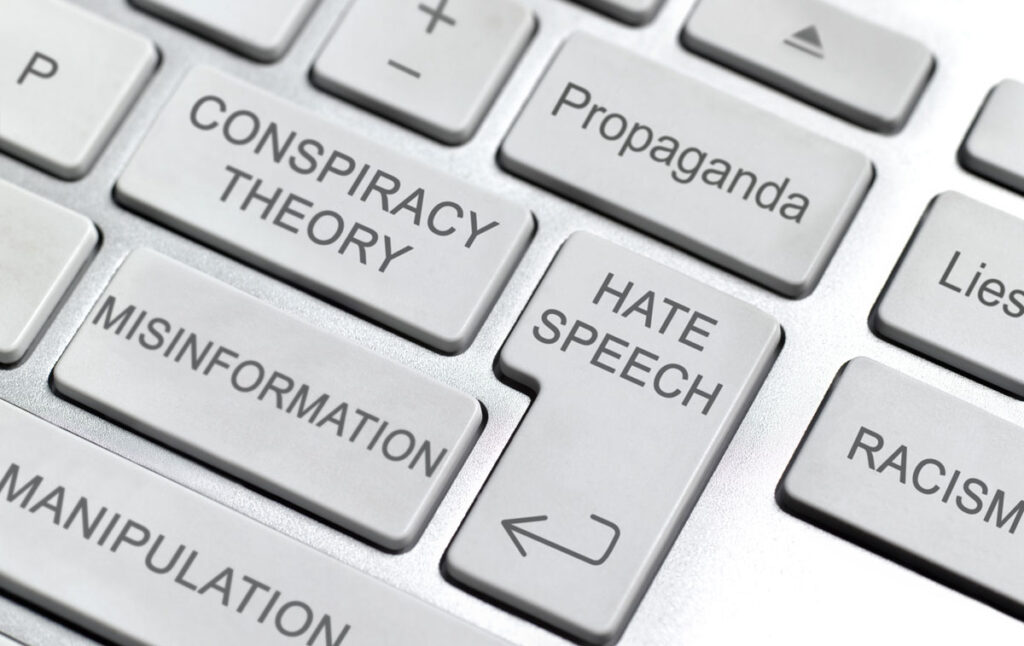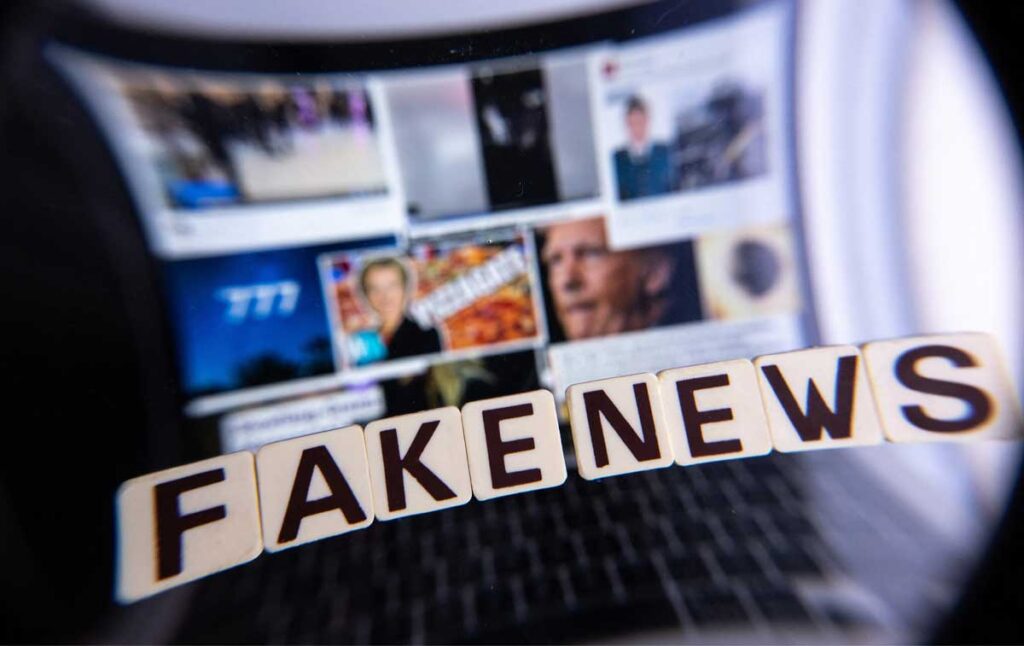The 2023 election cycle saw Nigerian voters overwhelmed with disinformation. Sponsored news blogs, social media accounts, and other mass media spread disinformation at a rate unprecedented in the country’s fragile democracy. Artificial intelligence-generated images and videos, as well as media posts, falsely linked candidates to terrorist groups, ethnocentric dialogues, and other criminal vices in the bid to besmirch their public image and tarnish their political chances. This disinformation was also used to rouse ethno-nationalist and religious sentiments among the voters.
Across the major political divides emerged three candidates, who had followings of devout cult-like believers. The ruling party, the All Progressives Congress (APC), had its candidate in Bola Ahmed Tinubu and his supporters called “BATists”; the major opposition, the Peoples Democratic Party (PDP), had its candidate, a former vice president, Atiku Abubakar, with his supporters known as “Atikulates”; and the third rising force, the Labour Party (LP), had its candidate, Peter Obi, who had a cult following commonly referred to as the “Obidients”. The political competition between these three divides was vicious, with slews of accusations thrown at each other in all manner of media.
The enthusiasm leading to the elections was high. According to the European Union Election Observation Mission Nigeria 2023, a record-breaking voter registration was captured, with an additional 9.5 million voters (mostly youths), bringing the total eligible voters to a record 93.4 million people. Youths in Nigeria were excited about the 2023 presidential elections for several reasons, including the emergence of a third force and the absence of an incumbent running in the presidential race. However, this enthusiasm was short-lived, as the outcome of the elections disappointed citizens. Other factors, such as hate campaigns, AI-generated disinformation, and attacks on voters and election officials, further soured the mood leading up to the election.
Nigeria is no stranger to political disinformation. Arthur Nwankwo noted in 2005 that since independence in 1960, Nigeria has been beset by conflicts over the attainment and control of power, which led to deadly pogroms such as the Action Group crisis of 1962-63, the Western Region election crisis of 1965, the military coup of 1966, the Igbo massacre in northern Nigeria between May and October 1966, the 1967-1970 civil war, and a slew of inter-ethnic wars and riots. In fact, propaganda has remained a mainstay of Nigeria’s electioneering process, with caricatures and disparaging information about opponents created and published in newspapers, magazines, calendars, and on posters.
The months leading up to the 2023 election cycle saw a great deal of media campaigning for and against candidates, especially concerning the presidential election. Journalist Eric Davis commented that AI-generated deep fakes used in media campaigns were not subtle. He argued that the supporters of the Labour Party candidate used AI-generated images and videos to enhance the public perception of their candidate, Peter Obi, in various instances, including deep fake videos depicting Nollywood actors, and even American celebrities like Elon Musk and Donald Trump, endorsing Obi for the presidency. Similarly, deep fakes were also used to undermine public opinions of candidates, such as the video depicting PDP candidate Atiku Abubakar and his supporters planning to rig the election. There was also the video, debunked by Reuters, which showed APC candidate Bola Tinubu incoherently responding to questions at the Chatham House leading up to the elections.

Explaining the effects of AI-generated disinformation is critical to the growth of African democracies. AI-generated images and videos often appear very real, and it would take great discernment to identify them as fake. This has enormous implications for Nigeria’s democracy and nation-building. Political scholar Gideon Isika commented in 2021 that Nigerian voters were not as politically educated as their counterparts in South Africa and Ghana, for example, and even when they were, they were too polarised by religious and ethnic sentiments to admit certain truths.
Isika also argued that most Nigerians had no access to fact-checking applications or websites, making it difficult for an organic pursuit of political truth. This, in turn, left citizens at the mercy of the media to which they were exposed. Likewise, most Nigerian citizens are poor (in fact, the World Bank’s 2023 multi-dimensional poverty headcount ratio points out that 63% of Nigerians are poor), may not afford gadgets to follow up on election trends, and are more likely to follow the behest of the party leaders.
Nigeria often prides itself on being a bastion of peace, freedom, unity, and progress. However, evidence over the country’s six decades of existence shows that its citizens have lost faith in these virtues and have aligned their interests and political aspirations with distinctive ethno-religious identities. Hence, election cycles in the country emphasise these socially constructed identities, which are readily exploited by the political class.
A 2024 Africa Centre for Strategic Studies paper argued that “the proliferation of disinformation is a fundamental challenge to African democracy, as it can intentionally polarise the voters, lead to deadly violence, serve as smokescreens for corrupt regimes, validate military interventions, and cow civil societies into silence.”
During the 2023 elections, independent analytics like HumAngle analysed thousands of media posts on Twitter, finding a pattern of inorganic hashtags and misinformation being spread by social media influencers and bot accounts in an effort to undermine competitors and take advantage of voter sentiment.
Even though INEC had not yet revealed the official results, election results started to leak on social media platforms like Facebook and X on the evening of 25 February 2023. The fact that votes were still being counted in several local government areas raised doubts about the leaked results, the objective of which was to evoke voter mood and heighten dissent regarding the official results.
Claims and election results flooded the internet from numerous partisan accounts on X (some of which have been deactivated), including the APC Presidential Campaign Council (@APCPresCC2022), Babakura Modu (@Babakuramadu), NìyÍ Akinsiju (@AgbaakinImodoye, @biyora1, @dipoaina1, @gen_buhar, @kashimmedias, @sparkle_akoga, and @theml007). Meltwater, an online media monitoring platform, claimed that 375,000 people were reached by these platforms, who either saw or responded to their posts. Since misinformation can be used to influence voters’ thoughts and feelings, these sorts of activities pose a serious threat to democracy.
For Nigeria and most of sub-Saharan Africa, the interplay of democracy and nationalism only became important after independence from their colonial masters. Owing to the struggle for control of resources, ethnic-motivated democracy continues to shape allegiances within these countries.
Ethnicity is sociologically significant in the discussion of democracy and nationalism in Nigeria. It can be construed as a situation where members of a group associate importance with their distinctive socio-demographic characteristics, such as language, dress, symbols and beliefs. Therefore, the democratic process in Nigeria (which is a game of numbers for and against sensibilities) is critically affected by these ethnic sentiments, creating obstacles to achieving a true nationalist ideology or even, at the very least, a viable nation-state. Addressing ethnicity is critical, since AI-generated disinformation can stimulate these sentiments, creating feelings of discord, distrust or even violence.
In addition to polarised ethnicity and culture, Nigeria’s electoral system has other challenges, such as inadequate electoral planning, execution and evaluation; the romance between electoral umpires and the political class; corruption and mismanagement in the electoral governing body, INEC; the country’s multi-party structure; as well as the size and population of the country. However, AI could be a useful tool in tackling election challenges due to its speed and versatility. AI trackers could be employed in subsequent elections to verify statements and reduce the lies and disinformation fed to voters. It could also be used in end-to-end systems, collating polls in real-time, even in remote areas, which would enhance transparency and accountability in the electoral process.

Emmanuel Orakwe is a PhD student and sociology lecturer at Alex Ekwueme Federal University, Nigeria. His doctoral thesis focuses on a comparative analysis of indigenous self-help strategies and formal social protection in poverty reduction among widows in isolated rural communities in Nigeria. He holds an MSc degree (sociology of development and social change), and his research deals with themes of power, marginalisation, class inequality, social protection, democratisation and social development.



